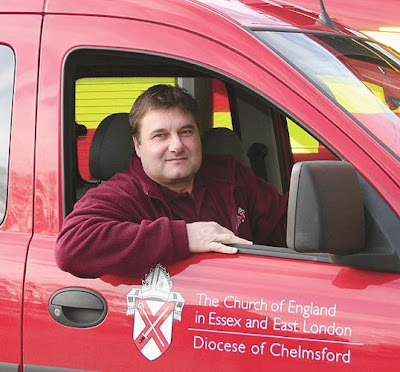
Below the fold is an article I have put together for the parish magazine. Regular readers won’t find much new, but I wanted to share my musings with a wider audience. The picture above was taken tonight.
Laying George Herbert to rest
For the last two or three years, I have been having an ongoing conversation about the nature of my ministry in these parishes, both with wardens and PCCs, and through the use of study days in both East and West Mersea, exploring whether the expectations upon clergy are either reasonable or Christian (those who read my blog will have read even more of my thoughts on this issue). I thought it would be good to share my thinking more widely, through this article in the magazine, and to describe one of the fruits of the discipleship campaign that is closely linked in with this question.
People may sometimes hear me talking about the ‘George Herbert model’ of ministry. This is the form of ministry that the clergy are still trained in, that the Church of England has largely followed for four hundred years, and which governs the expectations of most people in England – whether churchgoers or not – about what the role of a priest is. It is derived from the ministry and writings of George Herbert, who was, after an academic training, installed as Rector of Bemerton, near Salisbury. It centres upon regular and routine pastoral visiting – the clergyman being available for conversation and simple ‘being with’ the members of the parish. It is a very attractive model of ministry. Unfortunately it is wholly untenable as a model for a contemporary incumbent, and I’d like to explain why.
George Herbert’s village had some 300 souls living within it. Not only was Herbert a full-time minister there, he was assisted by the ministry of several full-time curates. That is the context within which his model of ministry could work – it would be as if East Mersea had four full time clergy available to minister to the needs of the parishioners. Instead, in a benefice of some 10,000 population, and four different parishes with their own competing demands and expectations, there is one full time minister assisted (during the week), by one half-time minister, paid for by the generosity of the West Mersea congregation, and various lay and retired members of the ministry team. A model of ministry that was viable in George Herbert’s situation is simply not viable on Mersea in the 21st Century.
An instructive comparison can be drawn with the medical profession, which was also, originally, constructed around house to house visiting by the doctor. In response to the phenomenal growth in population, and demand upon their services, doctors adapted and developed the surgery system, whereby those who were unwell came to a central point in order to be ministered to, leading to gains in efficiency and collegiality amongst the medical profession. Broadly speaking, the number of doctors in the population has increased commensurately with the rise in population – in contrast, the number of Anglican clergy has more than halved through the 20th Century, and the decline has accelerated in recent decades. There are now more and more parishioners expecting support from less and less clergy.
This is an issue which is not unique to Mersea, and there has been a great deal of thinking within the Church of England about how to respond to this changed context. Bob Jackson, in his influential book ‘Hope for the Church’, describes different sized churches and the different forms of ministry required. This is his typology:
a) the family church (1 – 50 members); these are dominated by a handful of families and the pastor acts effectively as a local chaplain;
b) the pastoral church (50 – 150 members); here the minister is pastor to all the members of the church, and the relationship with the minister is key (for both growth and death); (these first two can more or less be managed on a George Herbert model of ministry, though not at the same time);
c) the multiple-benefice church, which can combine a number of the above, in which the minister supports various lay members to plug their own gaps; and
d) the programme church (150 – 400 members) where there is a team with specialisation, and the incumbent becomes more of a manager than a pastor, who “resources programmes, enables the ministry of others, gives dynamic vision & leads others in mission”.
The Mersea Benefice effectively includes all four: one programme-size church, one pastoral church and two family churches, all in one multiple-benefice. The simple consequence of this fact is that the model of ministry that the incumbent here has to adopt is very different to that of George Herbert! Herbert also operated within a context where Christianity was broadly accepted and understood; not a context where Christianity is widely seen as a discredited superstition, and where the work of mission is imperative.
Most importantly, there is a truth about Christian discipleship, which the George Herbert model has obscured, if not entirely eclipsed, and that is the fundamental calling to ministry made upon all the baptised, as a part of their own Christian faith. The pernicious side of the George Herbert model is that the priest carried out the ministry of the church on behalf of the congregation, giving rise to the assumption that unless the Christian who came to visit was wearing a dog collar then it wasn’t a ‘real’ action of the church community. This is an increasing problem today, and I do see it as one of the core tasks of the church community to challenge expectations and assumptions in this area. Accepting that the pastoral has priority – and yet that it is impossible for any one minister to carry it all out – I see an essential element as setting up a structure and environment within which the wider body can take forward this task. This has now begun in West Mersea, with the establishment of a pastoral group under the leadership of Rev. Mark and Terry Walker, our licensed Pastoral Assistant. There is a good Scriptural precedent for the situation that we face, and for the establishment of such a wider ministry, and that can be found in Acts 6.1-7, when the office of Deacon was insituted in order that the apostles might ‘give [their] attention to prayer and the ministry of the Word’. So in the first instance, when you become aware of someone in need of an initial pastoral visit, please contact either Terry or Mark.
Underlying this apostolic approach is the idea of a ‘spectrum of pastoral care’, rather like this: Prevention (eg teaching) -> Availability -> Casual contact -> Contact at church -> Home visits -> Counselling -> Crises. In parishes below a certain size the pastor can carry out all of these, and this was what made the George Herbert model workable. However, beyond a certain size, the priest has to specialise and choose which of those pastoral forms to carry out him or herself, and which need to be passed on to others.
Which brings me to the question of what my particular ministry is going to be concentrating on, here in Mersea. There are several factors feeding in to my reflections on this. To begin with my own context, I am completely deaf in my left ear (since birth), and this means that conversation, especially in noisy environments, is extremely draining for me, and I have to be judicious in how I use my capacity for listening. Paradoxically, it has meant that, particularly in one-on-one situations, I can listen well, and I have grounds for thinking that a significant part of my vocation is in ‘spiritual direction’. That might be compared to routine visiting in the same way that surgery is compared to the work of a general practitioner – some elements of spiritual health require a more specialised engagement, which I believe, deo gratia, is something I have a capacity for and calling to. This ministry, inevitably, operates beneath the horizon of visibility of what the congregation sees, but it is a significant element of what I do.
The second factor is a wider understanding of my own gifts, and which elements of the job will allow my own own vocation to flourish. I greatly enjoy the teaching side of the ministry, which is most visible in the Learning Church sequence, but also through regular preaching (which I would like to give much more of my time to) and through things like the confirmation classes and the house groups. In so far as it is possible to specialise within the ‘spectrum of pastoral care’, then, it is the elements in the middle which I seek to encourage other members of the Body to take on, so that I can focus on the two extremes of teaching and spiritual direction.
In addition to this, I also see availability as important. In the last few weeks, for example, I was telephoned by someone who has been given a diagnosis of terminal cancer, and – naturally – wanted to have a chat. Thankfully, I was able to minister to her, but that can only happen when there is sufficient ‘give’ in the timetable – and this raises the question of overall workload, including how many hours I work per week. It might be helpful to list my official duties (not in order of priority, and it may be incomplete):
1. Incumbency duties. Fundamentally this is about discerning God’s will for four church communities; more mundanely these are the unavoidable administrative elements of my job. So: chairing four parish church councils; the associated committees (worship, teaching, communications, standing etc); regular meetings with wardens (eight of them!); all the paraphernalia associated with this.
2. Staff management. There is quite a team developing here, so as well as things like arranging the rota, this includes bilateral meetings on a regular basis with the various members of the team.
3. Worship. The leading and preparation of worship, especially at major feasts. This includes music, which varies in its demands on my time.
4. Pastoralia. I have lead pastoral responsibility for the parishioners; in practice much of this is now delegated to the pastoral group, so I have more of an oversight role. I do see a handful of parishioners for spiritual conversations, this is a variable load.
5. Occasional offices. Baptisms, weddings and funerals.
6. Teaching. Including sermons, bible groups, confirmation classes and the Learning Church sequence.
7. Intercession and private devotions. Praying for the parish and for particular individuals within it; making sure I have enough spiritual fuel in my own tank.
8. Chair of Churches Together in Mersea
9. Warden of Ordinands for 3 deaneries
10. Tutor for Eastern Region Ministry Training Course
Generally speaking I work between 55 and 60 hours a week on these tasks. However, I’ve recently come to the conclusion that this is unsustainable, and that it is unfair, on my family most especially, for me to maintain that workrate indefinitely. I am therefore planning on reducing the hours of work down towards 40 or so, principally through reducing what I do on Wednesdays (my day off being Thursday). It is, of course, more than questionable to think of the priestly vocation in terms of hours spent ‘working’, as the whole point of the vocation is that it allows me to become the person whom God is calling me to be – but that simply returns back to the question of specialisation, and what I am going to concentrate my time on. I am very fond of the writings of Eugene Peterson, who summarises the pastoral task under three headings: to pray and lead worship; to teach and to preach; and to exercise overall pastoral care for the congregation, especially in spiritual direction. Those remain the core elements of my vocation as I see them, and what I intend to focus my energies upon.
When a priest is ordained, they are charged to ‘take the good shepherd as the pattern of [their] calling’ – in other words to look to Jesus and take him as the exemplar of ministry to be followed. Jesus was an itinerant teacher, who concentrated most of his effort upon a small group of disciples, teaching them how to carry forward this different way of life that we now call the church. His pastoral side was episodic and unprogrammed; most of the time those in need came directly to him for healing. Above all, Jesus was robust in carving out time to be spent with the Father, for his re-creation, which resourced him in everything else that he did. It is remarkable how unlike Jesus’ ministry the George Herbert model actually is; and it is abundantly clear to me who I must follow.







